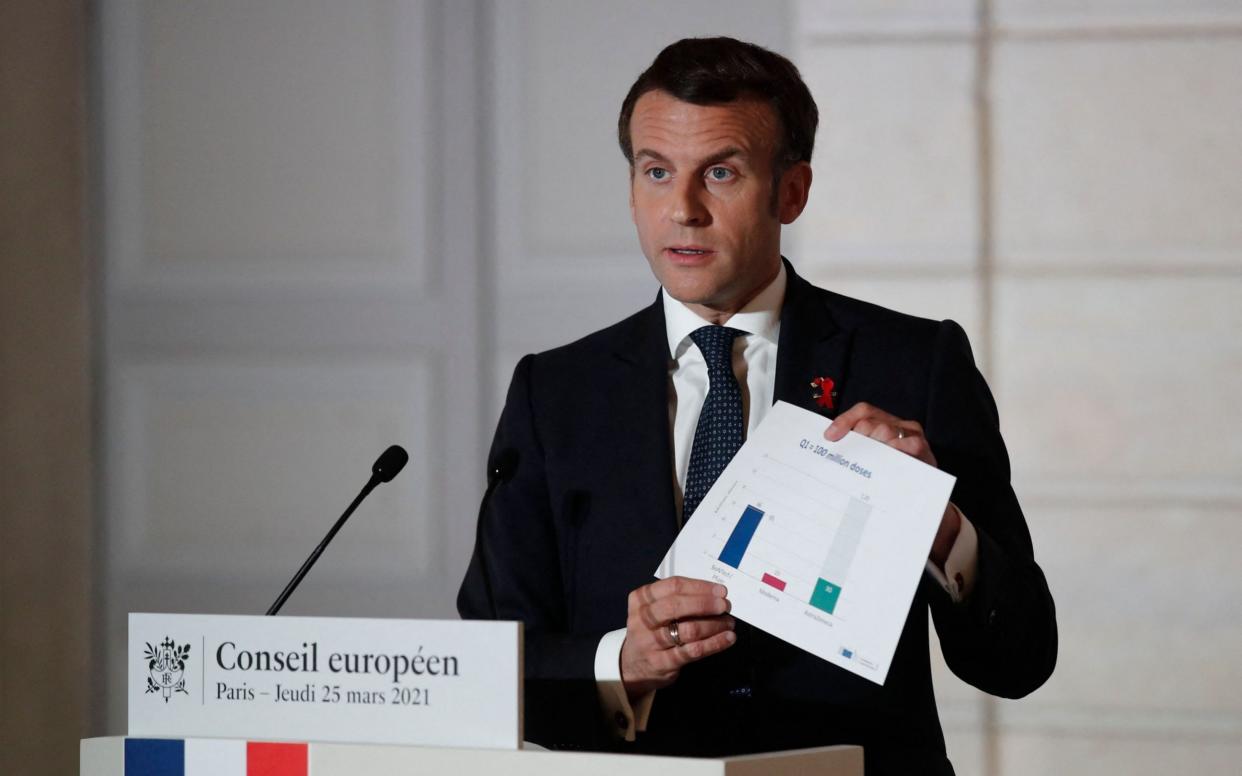Emmanuel Macron backs EU Covid vaccine export ban but is overruled


Emmanuel Macron on Thursday night backed EU export bans on AstraZeneca vaccines to Britain, saying that no company that broke contracts with Brussels should be allowed to ship jabs out of the bloc.
Despite the French president’s support, EU leaders refused to jointly back Ursula von der Leyen’s plans for tougher export controls on vaccines on Thursday night amid fears of sparking a vaccine trade war.
The European Commission president has introduced legislation giving Brussels the power to impose vaccine export bans on countries with higher vaccination rates than the EU, such as Britain.
“It's the end of naivety,” Mr Macron said, “I support export control mechanisms put in place by the European Commission. I support the fact that we must block all exports for as long as some drug companies don't respect their commitments with Europeans”.
“Every day, when I read the press across the Channel, they make a case against us saying that it is the EU that is being selfish. This is false!”, Mr Macron, who vowed Europe would become the world's biggest vaccine producer by the summer, said.
Angela Merkel, the German chancellor, said the bloc had, "absolutely no desire to disturb the global supply chain" but added the EU "had an interest" in ensuring companies like AstraZeneca respected their contractual obligations.
France, Italy and Spain had pushed for the European Council to publicly back the new rules, which would also allow Brussels to block exports to countries that manufacture jabs but do not send them to the EU, like the UK.
Watch: Brussels tightens vaccine export rules to ensure jabs stay in the bloc
The Netherlands, Belgium, and Ireland warned against the risk of Britain retaliating by blocking exports of raw materials for vaccines to the EU. Despite the lack of support, the rules are already in force through an “implementing regulation”.
“Companies have to honour their contract to the European Union before they export to other regions in the world. And this is of course the case with AstraZeneca,” said Mrs von der Leyen after the summit, before adding the firm would have to “catch up” before it could export outside the EU.
She said AstraZeneca had committed to deliveries of just 70m doses instead of the promised 180m for the second quarter.
Jean-Claude Juncker, the former European Commission president, attacked Mrs von der Leyen for risking a trade war on Thursday as new rules came in which will allow Brussels to impose export bans on countries like Britain with higher vaccination rates.
“We are not in war and we are not enemies – we are allies,” Mr Juncker said as he warned a ban would cause the EU “major reputational damage”.
The commission has threatened to block the export of potentially millions of AstraZeneca vaccines from the company’s Halix plant in Leiden, the Netherlands after the firm infuriated Brussels with shortfalls in deliveries.
It wants the UK to forego its first refusal on supplies from AstraZeneca’s two British plants so they can supply the bloc.

Mrs von der Leyen gave a powerpoint presentation to EU leaders that brutally exposed the extent of Britain’s dependency on EU supplies.
She said the EU had exported a total of 21 million vaccines to the UK since December. Just over a million were AstraZeneca jabs and the rest Pfizer.
Another nine million or so were either manufactured in Britain, which will not be able to replace the EU supplies by itself, or imported from non-EU countries such as India, which has delayed deliveries.
If it is to complete the second phase of its rollout, Britain will need the EU imports.
The commission briefed member states before the summit that Britain’s strategy of giving as many people their first dose as quickly as possible means the UK has no stockpiles of the jabs.
About 28.7 million in Britain had their first dose by Wednesday. Some 2.5 million are fully vaccinated with a second, leaving about 26 million at risk of not being fully inoculated.
Britain has given a first dose to more than half its adults, while the much larger EU has jabbed only 12 per cent.
Internal Market Commissioner Thierry Breton warned senior diplomats in Brussels on Tuesday that continuing to supply the UK would necessarily mean even fewer vaccines for the EU.
Watch: Key moments in the 12 months since the UK’s first lockdown

 Yahoo News
Yahoo News 
